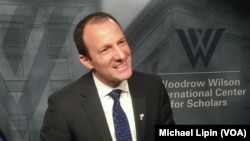U.S. President Donald Trump has invited Palestinian President Mahmoud Abbas to the White House in a bid to revive long-stalled Israeli-Palestinian peace talks.
White House Press Secretary Sean Spicer said Friday that Trump and Abbas agreed to meet at the U.S. executive mansion as they talked for the first time by telephone. Trump hosted Israeli Prime Minister Benjamin Netanyahu at the White House last month.
Spicer did not indicate when the meeting would take place, but the Abbas-controlled WAFA news agency quoted the Palestinian leader's spokesman, Nabil Abu Rdeneh, as saying it would take place soon, and focus on ways to resume the Israeli-Palestinian peace process.
During Friday's phone call, Rdeneh said, Trump expressed a desire for "real peace" between the two sides, while Abbas committed himself to the "strategic option" of establishing a Palestinian state living side by side with Israel in peace.
Late Friday, the White House released a readout of the phone call, which said Trump emphasized that the time had come to reach a peace deal.
"The president noted that such a deal would not only give Israelis and Palestinians the peace and security they deserve, but that it would reverberate positively throughout the region and the world," the White House statement said.
At the February 15 meeting with Netanyahu, Trump said he was not exclusively committed to a two-state solution to the Israeli-Palestinian conflict — a departure from the position held for years by his predecessors. Appearing alongside Trump at a news conference, Netanyahu did not explicitly commit himself to a two-state solution, either, but said he seeks a peace deal in which Palestinians recognize Israel as a Jewish state and agree to Israeli forces keeping security control over the occupied West Bank.
The Mideast peace process has been deadlocked since April 2014, when indirect talks led by then-Secretary of State John Kerry broke down.
Since then, Netanyahu has repeatedly offered to resume talks with Abbas without preconditions. Abbas has declined such offers, instead demanding a halt to Israeli settlement activity in the West Bank as a step toward negotiations. Israel recently has increased the pace of its settlement-building activity in the West Bank, the territory that Palestinians claim as theirs, for a future state.
On Tuesday, the U.S. ambassador to the United Nations, Nikki Haley, met for the first time with her Palestinian counterpart, Riyad Mansour. Haley wrote on Twitter afterward that the Palestinians should "meet with Israel in direct negotiations," rather than looking to the world body for solutions to their dispute.
Israel appears to be seeking U.S. support for a new strategy to relaunch direct talks with Palestinians — an approach outlined Thursday by Reuven Azar, deputy head of Israel's embassy in Washington.
Speaking at a Wilson Center forum attended by VOA Persian, Azar said Trump and Netanyahu agreed to form a U.S.-Israeli "working group" to strengthen the Palestinian economy, as a way of changing the status quo of the conflict.
Israel has begun allowing Israelis to enter parts of the West Bank to engage in economic activity with Palestinians despite security risks, Azar said, while Netanyahu has agreed in principle to allow the building of a Palestinian power station in the northern West Bank.
"As part of this working group that has gained the U.S. president's attention, I hope we'll be able to work with him to promote these projects and create economic prospects for the Palestinians," Azar said. "We need a path that leads us to a safe two-state solution."






